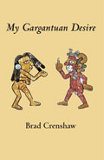Review by Ellen Miller-Mack

Greenhouse Review Press
3965 Bonny Doon Road
Santa Cruz, California 95060
ISBN 978-0-9655239-6-7
2010, 63 pp, $16.00
http://www.spdbooks.org
Brad Crenshaw’s My Gargantuan Desire is a volume of prose poems. As you find yourself pulled into the architecture of this engaging work, flip to the back of the book to “Apologia: Why Write Prose Poems?” and behold a secret: “I have… composed them as formal Shakespearean sonnets, after which I then dissolved the lines into their basic sentences.” Each piece is eight or nine lines long, in appealing rectangles. They have musicality not always associated with prose poems. Crenshaw refers to the prose poem as “the invisible format”, propelling me upstairs two steps at a time to one of my favorite essays by Carl Phillips, “A Brief Stop on the Trail of the Prose Poem” to get reoriented to the form.
Phillips says “The prose poem will likely include figurative language.” Crenshaw, with prodigious imagination and skill, fills his work with simile and metaphor, as in “Present Laughter”: “From across the room he looks a lot like a swami in full lotus hearing noises from the octopoid gods.” In “When Don Was Serious, Like a Hyacinth,”: “She really could dissect the white bear of the north.” How about this opulent sentence, in part IV of “Brain Cuttings”: “ How unlikely that this corporal brain I see suspended like a roast within its quart of fixative was greatly blamed for infidelities when she was thin and young and suffered the demented raptures of her manic illness—or even registered fantastical beliefs, ever captured in the name of truth the many words by which she knew herself, or spoke her world of feelings brief as air, or felt the pity of her lonely friend who found her curled and coked up, drifting in her private city.”
Carl Phillips says, “A second characteristic of prose poetry will be a general avoidance of completed narrative which is absent from purely lyric poetry and is specific to prose.” The poems in this volume are highly associative, with delightful riffs, odd solos and reports form the dream world. The poems seem to flirt with “closure”, fitted with good-natured trap doors. If narrative is “this happened, that happened,” that doesn’t happen in these poems. The voice, however, is direct, with strong opinions, telling us what’s what with authority, whatever the subject, as in “The Man with Two Hearts”: “His surgeon’s business slit his upper cavity and risked his life in ways you can’t imagine yet, unless you read his sentence in that mortal work and think it common sense to set the organs of a corpse, its heart and portal arteries, inside the chest of this prince of living gamblers.” And in “Georgia Pink on the Verge of Gloom”: “ I’m drawn to the blonde parts of her nutrition which I watch, unknown to the learned world, in waves of deep sensation as I starve my heart, botch the immanent miracle with a meager, creepy, sanctimonious, loyal reticence.”
If indeed “what makes the prose poem different from our more established, traditional forms is that it resists, again, definition at the level of craft” (Phillips) then Crenshaw’s volume of lyrical, formal sonnets turned into sentences could be considered “nonce” poems, or invented form. Hardly invisible!
The subjects of the poems cover wide territory, including male sexuality, brain dissection, the suffering of nursing home residents, marriage, love and life. In the book’s “Notes” you will learn intriguing facts about the anatomy of the human brain and the medical word for painful intercourse (dyspareunia).
As a medical person myself, running across a poem with a sentence like: “I’ve lost track of all his operations, the popliteal grafts, a triple CABG bypass, debrided ulcers and several amputations” artfully brings my worlds together, but how do you feel about that, Reader? From Crenshaw’s experience he conjures poems. They are conjured as well from love and compassion, as in “House of Cards”:
It’s good to be here, really, looking down her blouse the way her early suitors might have tried in 1918, and seen the grounds of their desire just out of reach. A life’s work for someone else than me. The world was all before her, where to choose her rest, the uses of her joy were new. Old friends were glad to think she’d been refreshed in marriage—five in all to tragic men who didn’t last. Inside this house the wife endured to bury five souls. Depend on it, she gave a world of thanks for those five, and high time for a sixth if her surgeons take those ample breasts but leave her heart intact.